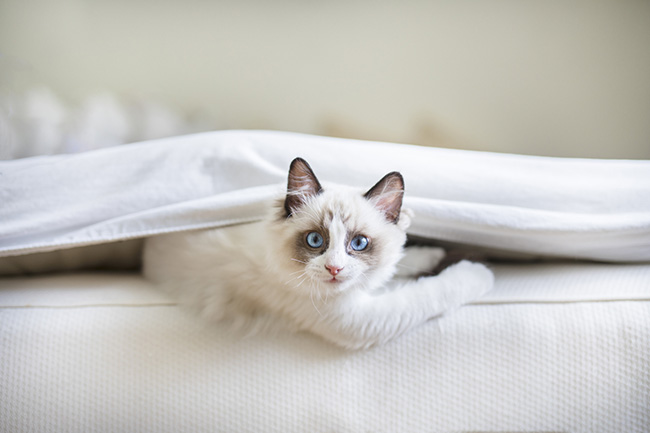Why Is My Cat Sneezing So Much in Broward County, FL?
Imagine settling in next to your sweet cat, and, all of a sudden, your feline friend launches into a sneezing fit. If this is a one-time occurrence, it may not be anything to worry about. Just like with humans, a sneeze can be caused by irritation of the nasal passages. In cats, it can also be caused by certain movements or excitement.
But what does it mean if your cat’s sneezing continues, or other symptoms pop up? It could be a sign that your cat needs the attention of a veterinary professional, not only to treat the symptoms but also to determine if there are other health issues at play.

What Causes Cat Sneezing?
Diagnosing the cause of a cat’s sneezing is not always easy. Often, pet owners confuse other symptoms – like gagging, coughing and wheezing – with sneezing. Another issue with figuring out the cause of sneezing is that it can be caused by a variety of underlying causes. In any case, a veterinarian can confirm if your cat is sneezing and what might be causing it.
Some of the common reasons your cat may be sneezing include:
Viral Upper Respiratory Infection
This type of infection is generally thought of as the origin of your cat’s sneezing problem. One of the most common is feline herpesvirus, which experts believe infects up to 90% of cats. In addition to the sneezing, a cat suffering from an upper respiratory infection may also experience discharge from the eyes and nose.
Other upper respiratory infections that may cause sneezing are calicivirus, a highly contagious disease, and influenza.
Inflammation of the Nose
While upper respiratory infections are a common cause of sneezing for cats, diseases that cause inflammation and irritation of the nose are also a main contributor to the issue. If no other causes are found, inflammation itself can be the cause of the problem.
You may hear your veterinarian refer to this as chronic rhinitis. This can happen when other problems have been eliminated, but the inflammation continues to cause your cat to sneeze.
Bacterial Infection
While bacterial infections are not typically the main cause of repeated sneezing, they can cause lingering symptoms. A sure sign of bacterial infection in cat’s is discolored discharge from the nose or the eyes.
What makes bacterial infections so problematic in cats is that they can severely damage the nasal passages, which can prevent your cat from fighting off other infections. One common bacterial infection that you may recognize is Bordetella, which is associated with respiratory disease.
Dental Disease
When it comes to the causes of sneezing in cats, dental disease may not an obvious contributor. However, because the of the proximity of the teeth along the upper jaw to the nasal cavities, an infection in a tooth could spread to the nose.
This can be very painful for your cat, so getting it treated as quickly as possible will help them stay comfortable. In most cases, the removal of the affected tooth will reduce the frequency of sneezing, unless it has already led to chronic rhinitis.
Allergens and Irritants
Allergies are another reason many cats sneeze. If you noticed your cat sneezing every now and then, try to note what you did before the sneezing started. Did you light candles? Has your cat recently used the litter box? Scents, dust, and other substances, such as perfumes, pest control sprays, and even cleaning supplies, can all cause an allergic reaction.
Other common reasons for your cats could include foreign objects making their way in the nasal passages, tumors or fungal infections. Some less common causes of sneezing are polyps and abnormalities in the structure of the nose or mouth.
When Should I Take My Cat to the Vet?
If your cat’s sneezing is infrequent, there may not be a need to seek medical attention. However, you will want to keep a close eye on your cat for a least a few days. In addition to more frequent sneezing, you also want to be on the lookout for other symptoms that could indicate a more serious problem, or underlying condition.
If you notice any of these symptoms, it is time to make an appointment with your vet:
- Discharge while sneezing (mild cases may have a clear discharge, while more severe cases may include bloody, or discolored discharge)
- Trouble breathing (breathing through the mouth, snoring, or strenuous breathing)
- Change in appetite
- Fever
- Tearing or discharge from the eyes
- Pawing at the face
In addition to a thorough physical exam, your veterinarian may also request other procedures to properly diagnose the cause of your cat’s sneezing. Those procedures could include x-rays, a rhinoscopy, biopsy.
Treating and Preventing My Cat’s Sneezing in Broward County, FL
After your veterinarian has done a full evaluation of your cat’s symptoms, and, hopefully, diagnosed the cause, there are a number of treatment options. Typically, the plan your veterinarian makes for you will largely depend on any underlying conditions that could be causing your cat’s sneezing.
Whichever treatment option you and your veterinarian decide is best for your cat, keep in mind that the goal is to make sure your cat sneezes less and their symptoms are less severe. Mild cases of sneezing can sometimes be treated with simple changes, such as using a humidifier or administering nose drops.
In more severe cases, other treatment options include antibiotics or steroids, fluids, or antihistamines. It is only in rare cases that surgical intervention is needed.
As a pet parent, it is likely that you would do anything you could to avoid your cat being uncomfortable or in pain. The good news about sneezing, is that there are several things you can do around your home to avoid irritation that could lead to your cat’s sneezing. Those include:
- Ensuring your cat’s vaccinations are current
- Checking the amount of dust that comes off your cat’s litter
- Using fewer scented products in your home, such as candles or wax burners
- Avoiding the use of too many chemicals when cleaning your cat’s space
Along with keeping vaccinations current, regular visits to your veterinarian are one of the surest ways to keep your cat happy and healthy. If have questions about your cat’s health, do not hesitate to reach out to the professionals.
